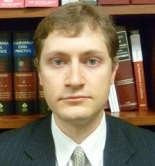Industry Insights
January 9, 2023
Grinberg: Voluntary vs. Compulsory Employment for County Jail Inmates
- State: California
- - 0 shares
In the case of Brown v. County of Los Angeles/Sheriff’s Department, applicant sought workers’ compensation benefits, alleging employment as an inmate of the county jail. Although the county enjoyed initial success on the trial level, its victory was lost before the Workers' Compensation Appeals Board commissioners.

Gregory Grinberg
What happened? Applicant was sentenced to 364 days in jail, where he signed up for a conservation work program to receive credits and expedite his release. Not two weeks after starting the program, he slipped and fell while walking to the print shop in which he worked. He visited urgent care and was released a few hours later to the work program.
Applicant sought workers’ compensation benefits, claiming he was an employee of the county, which the county denied. At trial, the judge found applicant was not an employee and was not entitled to benefits.
At trial, the judge relied on an ordinance from the 1970s issued by the County Board of Supervisors that inmates can be forced to work and that this would not constitute an employment relationship. The WCAB posed the test for employment of inmates as follows: Was the work compulsory or voluntary? If the work was compulsory, there is no employment relationship formed. If, however, it was voluntary then there is.
After weighing the evidence, including the fact that applicant had to apply for the job in the print shop and could be fired or withdrawn from that position at any time, the WCAB ruled that the job was voluntary and thus formed an employer-employee relationship between the county and applicant.
So, what are county jails to do? Well, it appears that to avoid workers’ compensation benefits, counties can compel labor from inmates rather than making it voluntary. Of course, counties will then face the same problem that every would-be compeller has faced throughout history: sabotage, poor work product, damages to machines and equipment.
Sounds like a decision above my pay grade, but it's something to consider — ideally before an injury is sustained by an inmate.
Gregory Grinberg is managing partner of Gale, Sutow & Associates’ S.F. Bay South office and a certified specialist in workers’ compensation law. This post is reprinted with permission from Grinberg’s WCDefenseCA blog.
Advertisements
Columns
- Barthel: Is Dubon II on the Way Out? 12/17/25
- Montgomery: San Fran City Official Stole $627k From Workers' Comp Division 12/10/25
- Kamin: Ring the Bells for Settlement Season 12/08/25
- Paduda: Does Comp Care About Workers? 12/05/25
- Sandoval: Throwing Subrogation Under the Bus 12/03/25
- Johnson: Some Thoughts on Apportionment - And SIBTF 11/20/25
- Montgomery: State's First Responders May File Comp Claims for Trauma 11/14/25
- Snyder: Use This New Survey to Negotiate Better 11/12/25
- Holden: Workers' Compensation Act Withstands Another Constitutional Attack 11/11/25
- Gelman: Sherrill's Win Locks in Worker Protections 11/10/25
- Kamin: Newsom Promises SIBTF Reforms in 2026 11/07/25
- Kamin: Comp Costs Hit Highest Combined Ratio Since 2001, WCIRB Says 11/05/25
- Montgomery: DIR to Blow $1.25M on Another Questionable Comp Study 11/03/25
- Wroten: California Sets the Standard as New Study Links Workplace Injuries to Heat Exposure 10/29/25
- Kamin: En Banc Clarifies Policy Reporting Requirements 10/27/25
- Gelman: PTSD-Stricken Officer's Disability Claim Denied 10/22/25
- Snyder: TAG a Structured Settlement Broker 10/17/25
- Snyder: New Medi-Cal Rules Can Affect Your Settlement 10/15/25
- Fish: Guarding Against PTSD Overdiagnosis 10/10/25
- Montgomery: DWC's MPN List Disappears Yet Again 10/08/25
Now Trending
- Workers' Compensation News
-
Calif. Fraud
Conviction Leads to $132,023
Restitution…
Posted on Dec 16, 2025
-
Calif. State Fund
Only Carrier Providing Benefits
Through Prepaid…
Posted on Dec 19, 2025
-
Calif. Former CHP
Officer Gets 270 Days for Fraud,
$360,620 Restitution…
Posted on Dec 19, 2025
-
Calif. DWC
Launches Online System for Public
Records…
Posted on Dec 19, 2025Kimberley J Pryor says: “Injured worker advocates must be very careful when uploading medical records to…”
-
N.J. Legislators
Seek to Block ABC Rule…
Posted on Dec 15, 2025
-
Ill. Insurance
Carrier Has Duty to Defend General
Contractor From Civil…
Posted on Dec 17, 2025
-
N.C. County Solely
Liable for Off-Duty Officer's
Injuries on Traffic…
Posted on Dec 16, 2025
-
Ntl. WCRI Webinar
to Cover Impact of Psychosocial
Factors on…
Posted on Dec 18, 2025
-
Texas More Than
Half of Providers Rated High-Tier…
Posted on Dec 18, 2025
-
Ga. Exclusivity
Bars Worker's Civil Claims for
Injuries From Attack by…
Posted on Dec 16, 2025
Jobs
- Workers' Compensation Defense Attorney (REMOTE)
- Workers’ Compensation Defense Attorney - 100% Remote
- In-house REMOTE Workers' Compensation Litigation Attorney
- Defense Attorneys - Remote Work Available
- Trial Attorney - Workers Compensation Staff Counsel
- Defense WC Attorney Wanted- We will beat any offer for the right candidate. Low billables, real bonuses and fast track equity partnership
- JC-495846 Workers’ Compensation Judge Workers' Compensation Jobs
Upcoming Events
Jan 15, 2026
Webinar: Psychosocial Factors
Discover how psychosocial factors impact recovery outcomes in injured workers during WCRI’s 30-min …
Jan 22, 2026 – Dec 22, 2025
Save the Date! Outlook 2026: W
WorkCompCentral is hosting a 120-minute, CA MCLE–accredited live webinar on January 22, 2026 (time …
Mar 3-4, 2026
Save The Date! WCRI’s 2026 Ann
Registration will open up in the coming months. We'll see you there! - Leading national workers' …
Social Media Links
c/o Business Insurance Holdings, Inc.
Greenwich, CT 06836




No Comments
Log in to post a comment